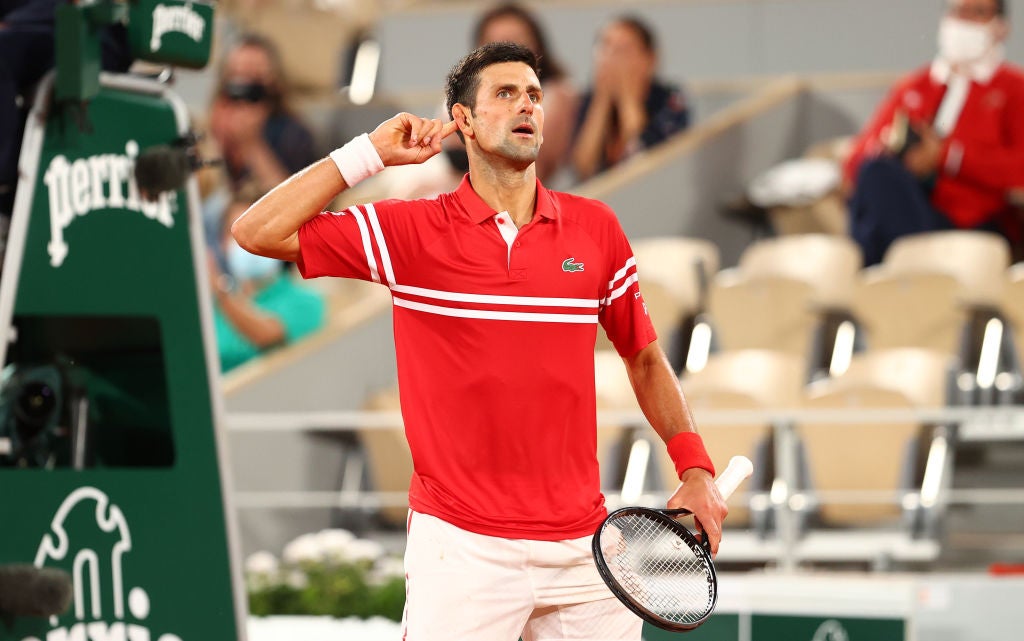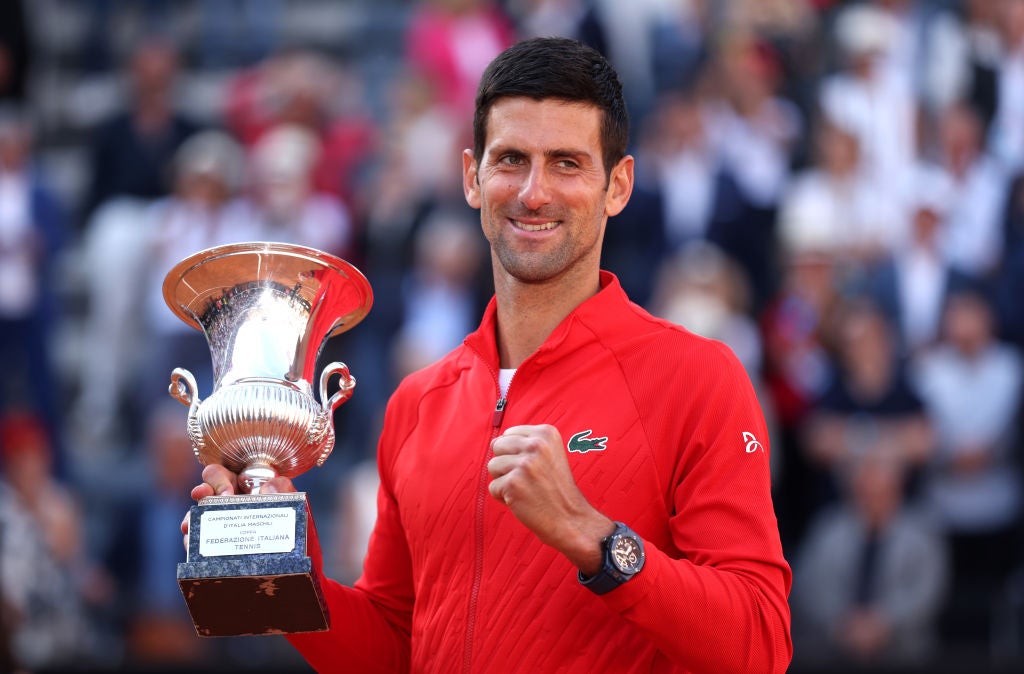French Open draw sets Novak Djokovic against the world on grand slam return
Returning to the grand slam stage for the first time since being kicked out of the Australian Open, Rafael Nadal and Carlos Alcaraz lie in wait as Djokovic finds himself in a familar position at Roland Garros

Your support helps us to tell the story
From reproductive rights to climate change to Big Tech, The Independent is on the ground when the story is developing. Whether it's investigating the financials of Elon Musk's pro-Trump PAC or producing our latest documentary, 'The A Word', which shines a light on the American women fighting for reproductive rights, we know how important it is to parse out the facts from the messaging.
At such a critical moment in US history, we need reporters on the ground. Your donation allows us to keep sending journalists to speak to both sides of the story.
The Independent is trusted by Americans across the entire political spectrum. And unlike many other quality news outlets, we choose not to lock Americans out of our reporting and analysis with paywalls. We believe quality journalism should be available to everyone, paid for by those who can afford it.
Your support makes all the difference.As if Novak Djokovic needed any more motivation ahead of the French Open. The talk of tennis right now is on the future and the seemingly indomitable pair of Iga Swiatek and Carlos Alcaraz, but there is also a grizzled and grittier tale to contest it. Djokovic’s return to the grand slam arena was never going to be a subtle one and Thursday’s draw has thrown up a line of targets directly in his path. The prospect of facing his great rival Rafael Nadal and then Alcaraz, the heir apparent, in order to reach the final ensures that once again, Djokovic should find himself centre stage once this all kicks off.
It is all there, clear to the eye and laid out for Djokovic in an unbalanced bracket grouping together three of the tournament favourites, to add another intriguing twist to a French Open already bursting with storylines. It is what we do when casting an eye over an upcoming tournament. Roland Garros and tennis is lucky to have a pair in Swiatek and Alcaraz arrive at such a stage in such confident form. Victory in Paris for either would be historic. Both would be pure romanticism.
But as we look for the narratives that will define the next two weeks, we also seek the stories of redemption, comeback, or a fight against adversity. It would be wrong to suggest Djokovic fits into any of those categories – he was not the victim of anything four months ago in Australia and has little, if anything, to prove – and yet Djokovic’s return to Roland Garros will be another fascinating examination of one of the sport’s greatest winners and an unrivalled mentality of steely determination that has continually set him apart. His story has a harder edge and has the potential to be divisive once again.
At least the focus will be on the tennis this time. The sport has long since moved on from what happened in Melbourne and it does not need to revisit it. It was ultimately Djokovic’s decision not to receive the Covid-19 vaccine and travel to Australia but the experience of what followed – the questioning in an airport cell, the overnight stays in an immigration detention centre, all while the eyes of the world peered in, hungry for more – left his confidence rattled and shaken. It was a pressure he had never experienced before.
It left him out of shape, too, and for the first time in years, vulnerable. The World No 1 was absent in Indian Wells and Miami as a further consequence of his vaccine decision. When he returned, he lost his first match back in Monte Carlo. He was defeated by Andrey Rublev in his home tournament in Belgrade. He was beaten, sensationally, by Alcaraz in Madrid, although it was there that the sparks began to fly once more.
A match of that level was what he needed. Djokovic’s victory in Rome last weekend, dismantling Stefanos Tsitsipas in the final, was an ominous sign of the Serbian returning to his best and peaking for Roland Garros. It’s almost as if he is getting back to business and it is what will fuel Djokovic over these two weeks. He is set to get the chance to strike back after having to watch from afar as Nadal climbed off the canvas to reclaim his Australian Open title to an outpouring of support in January. Nadal’s unexpected and sensational triumph in Melbourne, which helped tennis move on quickly from the messy Djokovic affair, also saw the 35-year-old break the tie for the grand slam record, a feat that looked set for Djokovic to take.

Few athletes command a stage quite like Nadal at the French Open, a tournament he has won 13 times, and it again puts into perspective Djokovic’s epic victory over the Spaniard in last year’s semi-finals. A persistent and painful foot injury has brought concern ahead of this year’s tournament but Nadal can never be ruled out, especially on this surface. A further meeting between the two would be titanic; for it to come as early as the quarter-finals threatens to topple an already top-heavy draw.
Nadal would be the crowd’s favourite if they were to face on Philippe Chatrier, as would Alacaraz if Djokovic were to play the 19-year-old in the semi-finals. The teenager’s rise and titles in Miami, Barcelona and Madrid have been too thrilling to ignore and the French Open would complete a remarkable ascension. It is inbetween Nadal and Alcaraz where Djokovic once again manages to find himself: the man who takes on the world, and relishes it as he does so.
Join our commenting forum
Join thought-provoking conversations, follow other Independent readers and see their replies
Comments